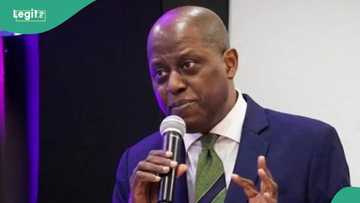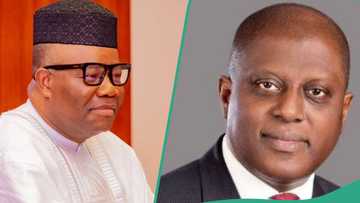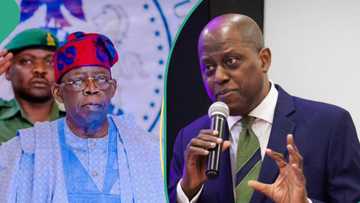Updated: Full List of CBN Governor from 1958 Till Date and Their Major Achievements
- The senate approved Olayemi Cardoso's appointment as the CBN’s substantive Governor on Tuesday, 27th September 2023.
- Cardoso took over from Folashodun Adebisi Shonubi as the acting CBN governor
- From Fenton in 1958, Cardoso is the 14th leader to head the CBN
On September 15, anticipating the Senate's confirmation, President Bola Tinubu accepted Cardoso's candidature as the new Governor of the Central Bank of Nigeria for five years. Godwin Emefiele, who purportedly left his position in August after the President suspended him, will be replaced by him.
The Senate approved Olayemi Cardoso's appointment as the Central Bank of Nigeria's actual Governor on Tuesday, 26th September 2023.
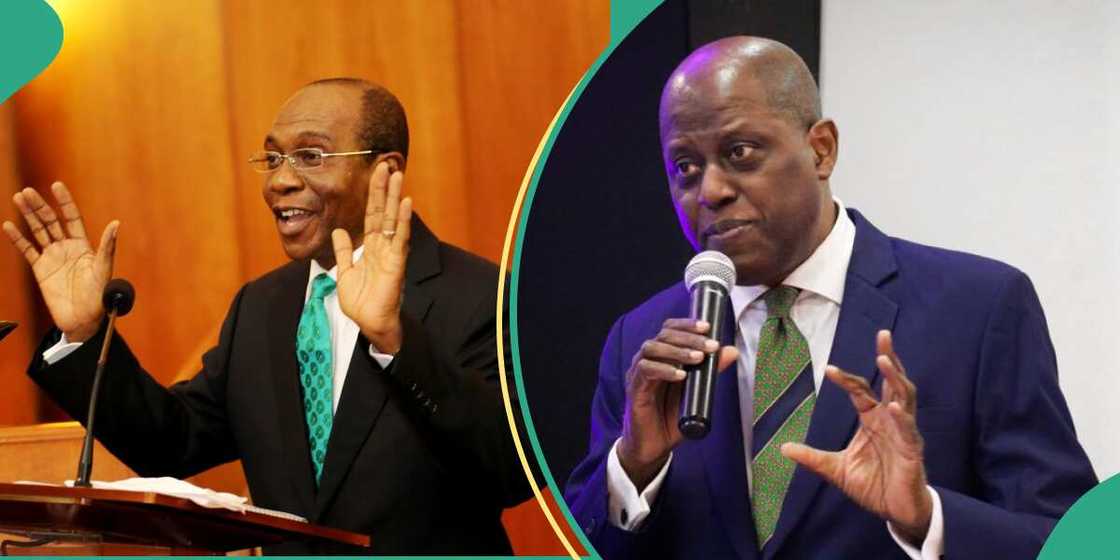
Source: UGC
He has over 40 years of experience as a leader and pioneer in the public, private, and development sectors. Cardoso also holds the titles of banker, certified stockbroker, and specialist in public policy.
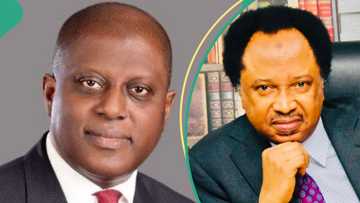
Read also
"Rescue naira", Shehu Sani lists what Nigerians expect from new CBN governor Olayemi Cardoso
He served as commissioner in the Lagos State Ministry of Economic Planning and Budget chairman of the African Venture Philanthropy Alliance board. Punch reported that most recently, for 12 years as chairman of Citibank Nigeria Ltd., until his resignation in 2022.
PAY ATTENTION: Сheck out news that is picked exactly for YOU ➡️ find the “Recommended for you” block on the home page and enjoy!
Legit.ng earlier highlighted the list of Nigerian presidents and the CBN governor they worked with.
The CBN was created in 1958
Notably, the CBN was created in 1958. It manages Nigeria's financial system and releases the naira, the nation's official currency. The CBN is also in charge of overseeing Nigeria's foreign exchange reserves and fostering economic expansion.
Over the years, the CBN has been run by various governors. Roy Pentelow Fenton, the first governor, was an immigrant from the United Kingdom. He held the position from 1958 to 1963, when Alhaji Aliyu Mai-Bornu, the first Nigerian to lead the CBN, took over.
In this report, Legit.ng spotlight the significant achievement by each of the CBN governors:
1. Roy Pentelow Fenton (July 24, 1958 – July 24, 1963)
Fenton's initiatives contributed to establishing the framework for Nigeria's economic growth. He contributed to developing the nation's financial system and established the CBN as a reliable organization.
2. Aliyu Mai-Bornu (July 25, 1963 – June 22, 1967)
Mai-Bornu oversaw the introduction of the naira for the first time in 1967. This served as a metaphor for the country's independence and economic autonomy and represented a significant turning point in the growth of the Nigerian economy.
3. Clement Nyong Isong (August 15, 1967 – September 22, 1975)
Isong made a substantial contribution to the expansion of Nigeria's agricultural sector. He put into effect a number of policies that raised agricultural output and exports.
4. Adamu Ciroma (September 24, 1975 – June 28, 1977)
Ciroma helped establish the NNPC in 1977. The NNPC is a prominent economic player in Nigeria and has made a substantial contribution to the development of the nation's oil and gas industry.
5. Ola Vincent (June 28, 1977 – June 28, 1982)
Vincent was in charge of the SFEM's debut in 1986. The SFEM supported market liberalisation for foreign exchange as well as economic growth.
6. Abdulkadir Ahmed (June 28, 1982 – September 30, 1993)
Ahmed is credited with helping to stabilise Nigeria's economy in the 1980s. He put into action a series of policies that improved the country's balance of payments and reduced inflation.
7. Paul Agbai Ogwuma (October 1, 1993 – May 29, 1999)
Agbai played a critical role in Nigeria's banking sector reform in the beginning of the 2000s. He put into place certain rules that strengthened and enhanced the banking system.
8. Joseph Oladele Sanusi (May 29, 1999 – May 29, 2004)
Oladele made it possible for deregulation to be fully integrated into the IFEM (Inter-Bank Foreign Exchange Market). Announcing IFEM in October 1999. Additionally, his Eagles project was started with the intention of refocusing the CBN in the post-military era and developing a strategy for fulfilling the Bank's statutory duty through restructuring to alter its operating philosophy and business procedures.
9. Charles Chukwuma Soludo (May 29, 2004 – May 29, 2009)
Soludo led the fusion of the Nigerian financial sector in the early 2000s. Instead of more than 80 banks, there are presently only 25 in Nigeria. Consolidation resulted in a strengthening and improvement of the financial system.
Soludo also adopted the cashless system in 2012. Cashless transactions are cheaper because to the policy, which also encourages financial inclusion.
10. Sanusi Lamido Aminu Sanusi (June 3, 2009 – February 20, 2014)
Sanusi exposed fraud in Nigeria's banking sector in 2009. He also helped clean up the banking industry by removing certain dishonest bank officials.
11. Sarah Alade (Acting) (February 20, 2014 – June 3, 2014)
The Medium Term Economic Programme (MTP) for Nigeria and the IMF staff Monitored Programme/Standby Arrangement were both actively drafted by Alade.
12. Godwin Emefiele (June 3, 2014 – June 9, 2023)
Emefiele oversaw thimplementingwo programmes to promote economic growth and development: the Anchor Borrowers' Programme and the Real Sector Support Facility.
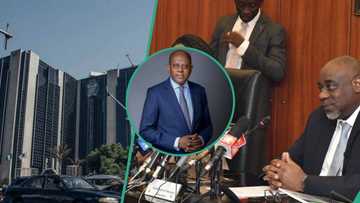
Read also
“We regret any inconvenience”: CBN suspends MPC meeting as Yemi Cardoso waits to become new governor
13. Folashodun Adebisi Shonubi (Acting) (June 9, 2023 – September 26)
14. Olayemi Cardoso (September 26 – Date)
Tony Elumelu Reacts to Being Considered to Be Appointed CBN Governor by President Tinubu
Tony Elumelu, the chairman of Heirs Holdings, has denied a report that he is being lined up as the next governor of the Central Bank of Nigeria (CBN), Legit.ng reported.
In a post shared on his X page (formerly known as Twitter) on Friday, September 1st, 2023, the billionaire businessman joked about the viral report and described it as false.
"LOL. No, please. This is false news! ," Tony Elumelu tweeted.
Source: Legit.ng


